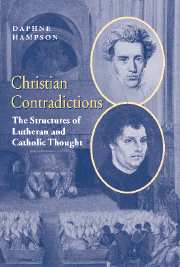Introduction
Published online by Cambridge University Press: 22 September 2009
Summary
Christian thought in the West has known one major disruption, that represented by the Reformation. The thought of Martin Luther may well be described as a shift in paradigm compared with that which preceded it. As is often the case with paradigm shifts, those who continued to belong to the previous paradigm (in this case Catholicism) have failed to appreciate what is at stake. The new system tends to be interpreted in terms of the old. Thus what is novel about it comes to be lost, or is simply not understood for what it is. Terms or concepts are taken from the new system and equated with what those terms or concepts meant within the previous system. The shift which has taken place, such that the new system revolves around a different axis and embodies different presuppositions, fails to be comprehended. Viewed through an inappropriate lens, the new system appears not to be systematic at all. What of course is needed is to jump wholesale from the old paradigm into the new, gaining a different orientation. Only then can comparisons between the two systems be made. But comparisons are also difficult, because the two paradigms are strictly non-comparable.
Catholic and Lutheran thought are differently structured. By way of shorthand, I shall designate Catholic thought as ‘linear’, whereas Lutheran thought by contrast revolves around a ‘dialectic’.
- Type
- Chapter
- Information
- Christian ContradictionsThe Structures of Lutheran and Catholic Thought, pp. 1 - 8Publisher: Cambridge University PressPrint publication year: 2001



